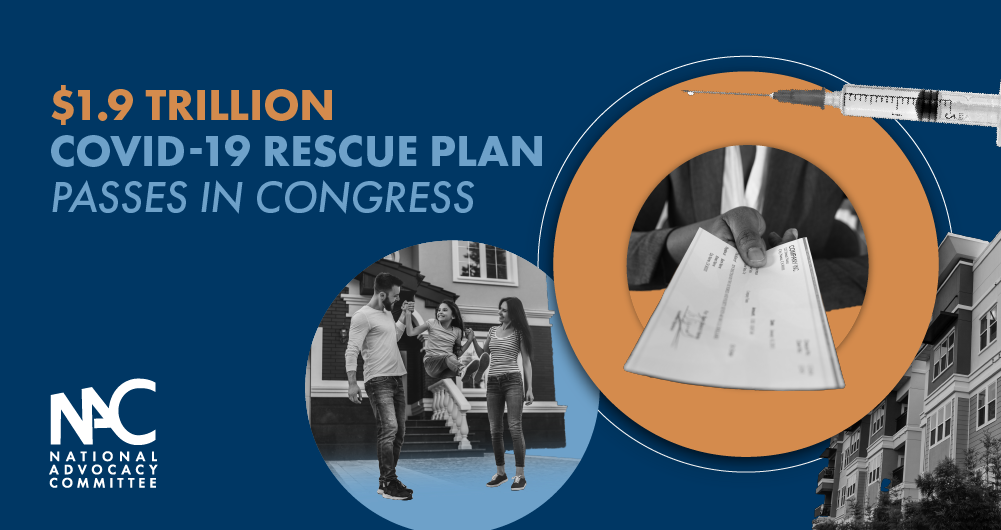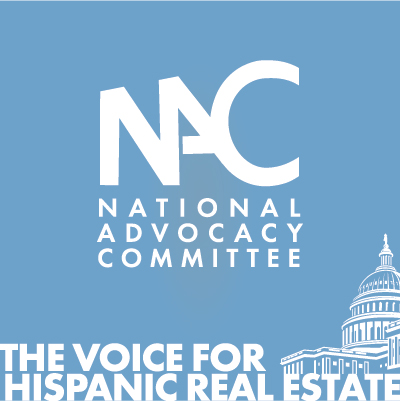The next American rescue package is here
Celebrating NAHREP familia, cultura, politics, and grassroots action
March 11, 2021
Qué onda mi gente?!
Como estan? Have you all registered for the 2021 NAHREP National Convention and Housing Policy Summit yet? Don’t forget that this year the conference is free to all members and only $50 for non-members. We’ve been working hard to make sure we bring you top-notch content, give you resources to help you grow as a professional, and cement yourself as a leader in your field and community. So excited to see you all virtually next month!
While NAHREP is focused on three key policy areas: housing Inventory, access to credit and immigration, our mission occurs within the context of the current economic realities. We advocated for stimulus packages all of last year and feel strongly that this new relief package was necessary for our country to normalize sooner rather than later. There were many items in here that we have long been advocating for and others that were a pleasant surprise. I hope all of you take advantage of programs you qualify for and share the rest with your communities.

$1.9 trillion COVID-19 Rescue Plan passes in Congress
Over the weekend, Congress passed the $1.9 trillion COVID Relief bill, the largest economic rescue plan in U.S. history. We thought we would bring you a summary of what you can expect from this new package. There’s a lot in here so let’s get right to it.
Direct Stimulus Payments
This package includes a third round of stimulus payments at $1,400 per eligible individual. Singles earning up to $75,000 will get the full amount, with the payments phasing out completely by $80,000 in income. Mixed-status families will also be included for all U.S. citizens or otherwise qualifying residents.
Small Business Support
Additional sources of capital for small businesses: The bill provides funding for several programs aimed at providing small business capital to the hardest hit small businesses. Including:
- $10 billion in funding for the State Small Business Credit Initiative (SSBCI) to help states set up programs to offer low-interest loans and other investments to entrepreneurs and the small business economy.
- $15 billion in new funding for Targeted Economic Injury Disaster Loans (EIDL) to provide hard hit, underserved small businesses with increased flexible grant relief. These grants will be particularly helpful for very small businesses and sole proprietors, like many in the NAHREP familia.
- $175 million in new assistance to fund organizations that connect small businesses to capital. The funds will go to community organizations, financial institutions and SBA resource partners with experience working in minority, immigrant, and rural communities, to help connect small business owners with loans, business licenses, and other business assistance programs.
Direct relief for restaurant industry: Restaurants have been hard hit and I know many of your clients and even family members are in the restaurant business. The bill will provide $28.6 billion in direct relief for the restaurant industry through the creation of a grant program. Over 110,000 restaurants and bars – more than one in six across the country – have closed permanently or long-term, causing the loss of over 2.4 million jobs.
Homeownership Support
Direct housing assistance: The bill provides several types of direct funding for homeowners struggling during the pandemic, including:
- $45 billion to help low-income households who have lost jobs pay rent, mortgages and utility bills.
- Nearly $10 billion in funding for states, territories and tribes to provide direct mortgage assistance to homeowners. This is something we’ve been advocating for since an estimated 3.3 million homeowners are behind on their payments or in foreclosure, so we were relieved to see this included.
- $39 million for the USDA Home Loan program to help rural homeowners who have fallen behind get back on track.
Housing Counseling: $100 million is dedicated to housing counseling programs distributed through NeighborWorks. This funding will allow counselors to help both homeowners and renters remain in their homes and avoid being faced with overwhelming debt burdens.
Fair Housing: $20 million has been set aside to help fair housing organizations meet increased lending needs.
Rental Assistance
Emergency Rental Assistance Program: The $25 billion in emergency rental assistance provided in the December package was a good start but falls short of the estimated $57 billion in back rent that renters already owed as of January. This package would set aside an additional $21.5 billion in rental assistance. This aid will help low-income households cover back rent and utility bills. This is especially important to our small landlords in our network.
To learn more about how to access the Emergency Rental Assistance Program, visit our COVID-19 Resource Center and tune into the upcoming Stimulus Bill Series virtual event on March 18.
Unemployment Insurance
Extension of unemployment benefits: The bill extends unemployment benefits for all workers, including:
- A weekly federal benefit of $300 through September 6, 2021.
- Benefits for self-employed individuals and gig economy workers, along with those who have exhausted their regular jobless benefits.
Federal tax relief: The first $10,200 in unemployment payments will not be taxed for workers in households earning up to $150,000 a year.
Stopping the spread and health ramifications of COVID-19
Vaccinations and testing: The package includes funding for vaccine distribution and testing, including:
- $160 billion in funding for vaccine and testing programs.
- Creates a national vaccine distribution program that would offer free shots to all U.S. residents regardless of immigration status.
- Funds the creation of community vaccination centers and mobile units for hard-to-reach areas.
Mental health support: The bill includes $3.88 billion to expand on those investments made in the year-end 2020 package to increase availability of treatment.
I’ve talked to many of you who have shared with me pretty heart wrenching stories about teenagers navigating depression. The need for accessible mental health and substance use disorder treatment has skyrocketed during the pandemic, with cash-strapped states and localities struggling to meet the need.
State and Local Fiscal Aid
National League of Cities survey showed a 21 percent revenue decline among cities with losses and the National Association of Counties projected a 20 percent revenue decline. These figures may grow worse over time as property tax revenue. The package provides $350 billion to States, territories, Tribes, and local governments to be used for responding to the COVID-19 public health emergency, to offset revenue losses, bolster economic recovery and to provide premium pay for essential workers. State and local fiscal relief funds can be used for local economic recovery purposes, including assistance to households, small businesses and nonprofits, assistance to hard-hit industries.
Expansion of federal tax credits
The bill provides an expansion of existing federal tax credits, including:
- Earned Income Tax Credit (EITC) will nearly triple for workers without children, providing additional relief to more than 17 million of these individuals.
- Child Tax Credit (CTC) will be increased from $2,000 to $3,000, with a more generous $3,600 credit for children under the age of 6. The CTC will also be fully refundable.
- Child and Dependent Care Tax Credit will be expanded to help working families afford the cost of child care during the crisis. This includes increasing the credit so households can receive a total of up to $4,000 for one child or $8,000 for two or more children, and making it fully refundable so families who owe little in taxes can still benefit.
Oversight of COVID-Relief Funding
Comprehensive oversight is needed to regain public trust and make sure federal dollars have been and continue to be spent responsibly. The bill supports the Government Accountability Office and the Pandemic Response Accountability Committee, which was created in the CARES Act, to provide oversight and keep Congress and the public informed about the unprecedented whole-of-government COVID-19 response and associated spending.
For questions on this package, please use our COVID-19 Resource Center which we will be updating with this new rescue plan details. Always know that we’re there to answer your questions so please ask your specific questions in the resource center so that we can get an answer for you right away.
Un abrazo familia. Los quiero muchísimo.

About Noerena Limón
Noerena Limón is NAHREP’s Executive Vice President of Public Policy and Industry Relations. Noerena heads the organization’s policy and advocacy efforts on issues ranging from homeownership, housing inventory, credit access and immigration.
Prior to joining NAHREP, Noerena spent six years at the Consumer Financial Protection Bureau (CFPB) and served as a political appointee under President Obama in the White House Office of Political Affairs.



